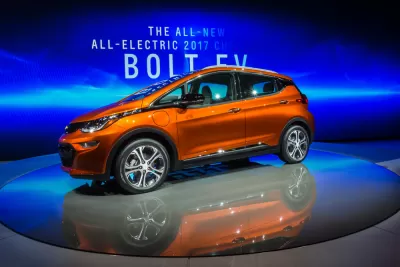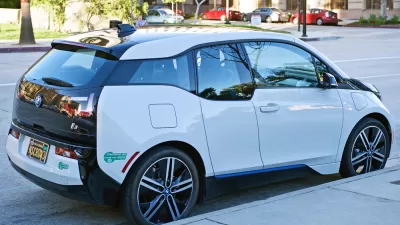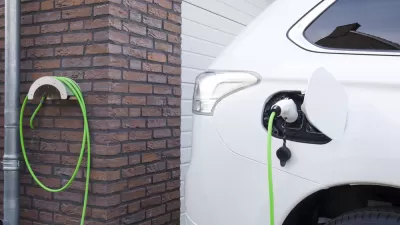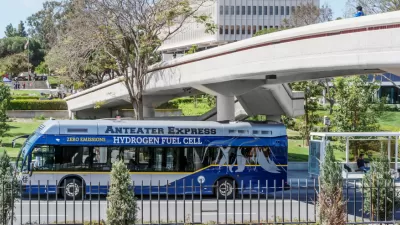Policymakers, auto manufacturers, and especially advocates are very engaged in transitioning from fossil fuel-powered vehicles to electric vehicles. The problem is that interest isn't shared by the general public, according to research by UC Davis.

Sales of electric vehicles (EVs) are on the rise. According to a report released by Next 10 on Jan. 30, sales of zero-emission vehicles (ZEVs), which includes fuel cell electric vehicles but not plug-in hybrid electric vehicles, grew by 29 percent last year compared to 2016 for both California and the U.S.
In addition, the number of EV models for sale has almost doubled in California from 2014 to 2017, and the number of public EV chargers has more than doubled in the Golden State during that time period. What has barely changed, though, is what UC Davis Institute of Transportation Studies researchers call the "engagement" factor among Californians in the transition from internal combustion vehicles to EVs. And that spells bad news for sustainability in the transportation sector, the source of 39 percent of the state's greenhouse gas emissions.
"There are no paths to meet the [plug-in electric vehicle] PEV commitments and promises being made by automakers and politicians unless consumers are engaged in the transition to electric drive," write Ken Kurani and Scott Hardman, researchers at the Plug-in Hybrid & Electric Vehicle Research Center in the UC Davis-ITS GreenLight Blog on Jan. 18. "Evidence from California says consumers are not."
The excitement among policymakers, automakers, and advocates as more PEV models enter the market place, more charging is installed, and more PEVs are sold each successive year is utterly lost on the vast majority of the car-buying public—even in California, touted as being among the global PEV market leaders.
The problem is the number of car owning households that are paying attention to PEVs is not growing.
Correspondent's note: The term, plug-in electric vehicles, or PEVs, includes any electric vehicle with a plug, such as the Chevy Volt that also burns gasoline, generally referred to as a plug-in hybrid electric vehicle, or PHEV, as well as a pure battery-electric vehicle, or BEV, e.g., a Tesla.
The basis of the research is five surveys conducted from June 2014 to June 2017 that "assessed Californian car-owning households’ awareness of and engagement with PEVs."
If one believes a transition to electric drive is well underway, then the percentages of households [either owning an PEV or had considered purchasing one] should be larger in 2017... They are not higher to any significant degree.
See their side-by-side charts showing responses to survey questions assessing basic interest in electric vehicles in 2014 and 2017. Note the lack of noticeable differences between the two years despite the significant increase in the rate of sales, charging infrastructure, and models available.
Similarly, responses to the awareness of non-residential EV chargers in California showed little change between the two years despite installations more than doubling from 5,700 in August 2014 to over 11,500 by August 2017, according to the California Energy Commission, note Kurani and Hardman.
The blog ends with the listing of seven tips for advocates and policymakers to increase consumers' awareness of electric vehicles that would hopefully lead them to consider purchasing one. Not listed was this correspondent's preferred market-based incentive to stimulate sales of EVs while concurrently potentially decreasing sales of fuel-hogs like large SUVs.
Research by none other than UC Davis along with UC Berkeley and UC Irvine on the effectiveness of emissions feebates was commissioned by the Calfornia Air Resources Board in 2008. Legislation to implement a feebate program died that year.
Hat tip to Eugene Wilson.
FULL STORY: Automakers and Policymakers May Be on a Path to Electric Vehicles; Consumers Aren’t

Alabama: Trump Terminates Settlements for Black Communities Harmed By Raw Sewage
Trump deemed the landmark civil rights agreement “illegal DEI and environmental justice policy.”

Study: Maui’s Plan to Convert Vacation Rentals to Long-Term Housing Could Cause Nearly $1 Billion Economic Loss
The plan would reduce visitor accommodation by 25% resulting in 1,900 jobs lost.

Planetizen Federal Action Tracker
A weekly monitor of how Trump’s orders and actions are impacting planners and planning in America.

Wind Energy on the Rise Despite Federal Policy Reversal
The Trump administration is revoking federal support for renewable energy, but demand for new projects continues unabated.

Passengers Flock to Caltrain After Electrification
The new electric trains are running faster and more reliably, leading to strong ridership growth on the Bay Area rail system.

Texas Churches Rally Behind ‘Yes in God’s Back Yard’ Legislation
Religious leaders want the state to reduce zoning regulations to streamline leasing church-owned land to housing developers.
Urban Design for Planners 1: Software Tools
This six-course series explores essential urban design concepts using open source software and equips planners with the tools they need to participate fully in the urban design process.
Planning for Universal Design
Learn the tools for implementing Universal Design in planning regulations.
Caltrans
Smith Gee Studio
Institute for Housing and Urban Development Studies (IHS)
City of Grandview
Harvard GSD Executive Education
Toledo-Lucas County Plan Commissions
Salt Lake City
NYU Wagner Graduate School of Public Service





























